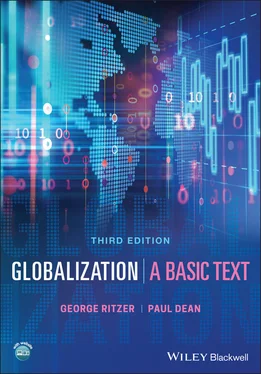7.2 The global value chain for the iPhone
7.3 Amazon’s global growth continues to dominate ecommerce, but at what cost
8.1 Huntington’s civilizations
8.2 The domains of the major religions
9.1 Global disinformation
10.1 Where do international migrants come from globally and live
10.2 Flows into low- and middle-income countries
11.1 Costs of acquiring sustainable water sources (as a percent of GDP)
11.2 Global shale gas development and water stress
11.3 Globally degraded forest and landscape restoration opportunities
12.1 COVID-19 rapidly spread around the world
12.2 Global terrorist attacks
12.3 Map of foreign fighters in Ukraine: 2014–2019 (as of June 1, 2019)
13.1 Cities powering globalization
14.1 The global slave trade forced millions of black people into slavery, mostly across the Atlantic Ocean and to the Americas
14.2 World maternal mortality
14.3 National laws on sexual orientation, 2019
14.4 Enfranchisement of women
15.1 Fairtrade around the world
15.2 Corruption perceptions index
15.3 Global demonstrations associated with BLM, May 24 – Aug 22, 2020
15.4 The boomerang pattern
As we revise this preface in January, 2021, we are struck by how much the events of the day both reflect, and are profoundly changing, the process of globalization. For example, all of our lives have been altered by the global pandemic of COVID-19. The deadly virus emerged in late 2019, and within a few short months, it had made its way around the entire globe. In a highly interconnected world, it was spread through cheap international air travel, cargo ships crossing the vast oceans, and domestic travelers carried it deeper into even remote regions. The pandemic brought the global economy to a grinding halt, plummeting international trade, and putting people out of work in virtually every country on the planet. The World Health Organization (WHO) coordinated a global response in an attempt to halt the virus but over a year into the pandemic, COVID-19 cases and deaths continue to mount. Fortunately, several promising vaccines have been developed and those too are making their way through global distribution networks in hopes of ending the deadly virus.
It has been particularly fascinating to watch global events unfold as we have continued writing the first, second, and third editions of this book. For instance, the first edition was published in the midst of the Great Recession. While writing the second edition, the global economy had stabilized but it had not yet rebounded to its prerecessionary levels for most parts of the world. A great number of scholars and activists argued that it was neoliberal policy (see Chapter 4) that led to the Great Recession, and as the economic turmoil wore on, some predicted its demise. But economic growth would resume (until COVID-19), and having emerged from the Great Recession, it became clear that neoliberalism remains a strong force in both global politics and the global economy.
In contrast to earlier editions, there are now more significant threats to globalization. As of this writing, one major threat is the spread of nationalist populism. In the last few decades, the rise of populist leaders in executive offices has increased four-fold globally. Populist leaders fashion themselves as political outsiders who will fight for “the people” and against “the establishment,” foreign invaders, or political elites. While some populist leaders have ushered in programs that help people broadly, they are more likely to act in antidemocratic ways that enrich themselves and increase inequality. For example, we are writing this preface just days after outgoing US President Donald Trump, a populist politician, encouraged his supporters to storm the US Capitol and overthrow a democratic election that he clearly lost. Populist leaders in the US, UK, Europe, Asia, Africa, and South America have campaigned against globalization, often targeting immigrants as scapegoats and using people’s fears to build walls between countries, or withdraw from international organizations, as Britons did with Brexit.
Compared with past editions of this book, more articles have appeared in popular media pondering the “beginning of the end of globalization” and “globalization in retreat.” While these articles usually exaggerate the actual threats, the continuation of globalizing forces are not as certain as they once were, and indeed there are some signs of de-globalization. In addition to the rise of nationalist populism and backlash to immigration, COVID-19 has fueled these trends. The virus revealed how reliant most countries had become on importing personal protective equipment (PPE), foods, and other essentials – pitting countries against each other to acquire needed supplies. Some leaders have expressed interest in bringing back critical production capacities to their own countries, but such motivation will likely diminish as the virus gets under control and the costs of domestic production for many countries are so much higher than imports.
The conflicts around globalization have been exacerbated by several recent trends – especially global climate change and increasing inequality. For example, global climate change is dramatically affecting economic processes and flows of people. Tens of thousands of people are losing their homes to rising sea levels, and are being displaced to other countries, thus creating new tensions around migration flows. Environmental problems themselves flow seamlessly across national borders and many of these problems, such as global warming and deforestation, have come to affect the entire planet – even those countries that have implemented environmentally sustainable policies.
Economic inequality is also increasing in virtually every country around the world. As neoliberal globalization has become dominant, the nature of available jobs has shifted and social safety nets have shrunk. The world’s elites move their money around the globe in complicated financial transactions to hide it from taxation, starving nations from needed tax revenue. With more competition for jobs and less support from the government, people find themselves fearful about the future. Populist politicians harness these fears, but rather than addressing corporate influence on government or systems of taxation, they place the blame on immigrants and the generalized “Other.”
The changes noted above illustrate some ways in which this third edition has been revised, and suggest that such topics will continue to be further revisited as other global processes become more apparent. Nonetheless, the basic foci, perspectives, concepts, and theories offered here apply to whatever changes are occurring in, and are in store for, globalization. Change is nothing new to globalization; indeed it could be argued that change, including cataclysmic events and changes (the Spanish influenza epidemic of 1919, the Great Depression, WW II), is an integral part of it. Furthermore, other elements of globalization – such as the spread of various cultural forms (e.g. hip-hop or K-pop), social media, and the Internet – are persistent and will remain highly globalized. Any useful perspective on globalization must be able to help us better understand the global changes and continuities.
Writing a general overview of globalization has been, to put it mildly, a daunting task. It is almost literally about everything – every place, every thing, everybody, and virtually every field of study. It also requires a sense of a wide expanse of history and of what it is about the present “global age” that differentiates it from epochs that came before it. We have been involved in textbooks before, including some that cover all of classical and contemporary sociological theory, but none has been more challenging than this one. Beyond the sheer magnitude of what needs to be covered, there is the fact that globalization, at least in its present form, is quite new, with the term itself entering the lexicon only four decades ago. As a relatively new phenomenon, it is constantly changing, as are conceptions of it. With few precedents to rely on, we have had to “invent” an approach to globalization (based on major theoretical sources), as well as create a structure for the book that encompasses most of the major topics and issues in globalization today. This is difficult enough, but it is made far more difficult by the fact that global changes (e.g. the price of that all-important commodity, oil; the landscape of global protests and conflict) occur constantly.
Читать дальше












